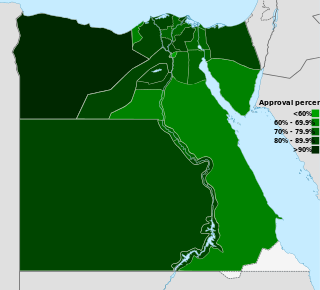 |
|---|
| This article is part of a series on the politics and government of Egypt |
| Constitution (history) |
Government |
Legislature |
| Political parties (former) |
A constitutional referendum was held in Egypt in two rounds on 15 and 22 December 2012. [1] Egyptians living abroad were scheduled to vote between 8 and 11 December. [2] Voting for expatriates had been delayed until 12 December 2012 [3] and was extended until 17 December 2012. [4] Voters were asked whether they approve of the draft constitution that was approved by the Constituent Assembly on 30 November 2012. [5]

Egypt, officially the Arab Republic of Egypt, is a country spanning the northeast corner of Africa and southwest corner of Asia by a land bridge formed by the Sinai Peninsula. Egypt is a Mediterranean country bordered by the Gaza Strip and Israel to the northeast, the Gulf of Aqaba and the Red Sea to the east, Sudan to the south, and Libya to the west. Across the Gulf of Aqaba lies Jordan, across the Red Sea lies Saudi Arabia, and across the Mediterranean lie Greece, Turkey and Cyprus, although none share a land border with Egypt.
Egyptian diaspora consists of citizens of Egypt abroad sharing a common culture and Egyptian Arabic language.

The Constitution of the Arab Republic of Egypt was the former fundamental law of Egypt. It was signed into law by President Mohamed Morsi on 26 December 2012, after it was approved by the Constituent Assembly on 30 November 2012 and passed in a referendum held 15–22 December 2012 with 64% support, and a turnout of 33%. It replaced the 2011 Provisional Constitution of Egypt, adopted in 2011 following the Egyptian revolution. On 3 July 2013, the constitution was suspended by order of the Egyptian army. On 8 July 2013, acting President Adly Mansour issued a decree that envisaged the introduction of amendments to the constitution and put them to a referendum; if approved, the suspended-constitution would be restored into law. The current constitutional declaration has the power of a constitution; it outlines the authorities of the president and establishes many rights.
Contents
- Background
- Judicial response
- Contents
- Campaign
- Supporters
- Opponents
- Results
- By governorate
- Reactions
- References
Unofficial results reported on 23 December 2012 found that 32.9% of the electorate voted and that the constitution was approved with 63.8% of the vote in favor over the two rounds of polling. [6]
During the campaign, supporters of the draft constitution argued that the constitution would provide stability. Most opponents argued that the constitution was too favorable to the Muslim Brotherhood, and did not grant sufficient minority rights. However, some extreme Salafists also opposed the constitution, arguing that it should have been based more closely on Sharia law.

The Society of the Muslim Brothers, better known as the Muslim Brotherhood, is a transnational Sunni Islamist organization founded in Egypt by Islamic scholar and schoolteacher Hassan al-Banna in 1928. The organization gained supporters throughout the Arab world and influenced other Islamist groups such as Hamas with its "model of political activism combined with Islamic charity work", and in 2012 sponsored the elected political party in Egypt after the January Revolution in 2011. However, it faced periodic government crackdowns for alleged terrorist activities, and as of 2015 is considered a terrorist organization by the governments of Bahrain, Egypt, Russia, Syria, Saudi Arabia and the United Arab Emirates.
Minority rights are the normal individual rights as applied to members of racial, ethnic, class, religious, linguistic or gender and sexual minorities; and also the collective rights accorded to minority groups. Minority rights may also apply simply to individual rights of anyone who is not part of a majority decision.
Sharia, Islamic law or Sharia law is a religious law forming part of the Islamic tradition. It is derived from the religious precepts of Islam, particularly the Quran and the Hadith. In Arabic, the term sharīʿah refers to God's immutable divine law and is contrasted with fiqh, which refers to its human scholarly interpretations. The manner of its application in modern times has been a subject of dispute between Muslim fundamentalists and modernists.
The supreme committee for supervising the constitution referendum was formed on 3 December 2012. [7] Mohammad Salim Al-Awa stated that a new Constituent Assembly would be formed within three months through general elections if the draft Constitution was voted down. The new assembly would have six months to write the new constitution. [8] The general secretary of the constitution referendum supreme committee resigned for health reasons. [9]
Mohammad Salim Al-Awa is an Egyptian Islamist thinker, widely considered to belong to the moderate Islamic democratic strain. He is the former Secretary General of the International Union for Muslim Scholars based in London, and head of the Egyptian Association for Culture and Dialogue. Al-Awa has been called one of the few Islamic thinkers who has made a "serious attempt" at "defining what Islamism would mean in a modern society," or "courageously delved into the realities of Islamic history and experimented with new interpretations."









